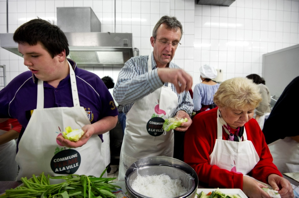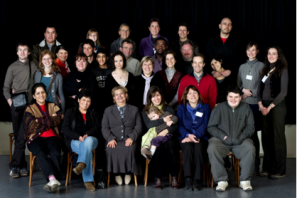SUSTAINABLE FOOD CHALLENGE
May 28, 2013
Contributor: Brussels Environment
Workshop:
Governance, synergies and local systems / Final consumers – Low-income Households & multi-ethnic communities
Super -motivated families take on the “sustainable food challenge”


Keen on new and enriching experiences for its residents, the municipality of Etterbeek has launched a formidable challenge to some of its households, the challenge to orient their daily lives towards sustainable food.
On the agenda are around fifteen group activities in which each household sets to work. Between the cooking classes, information sessions, nutritional coaching, visits to the farm or the supermarket and the various workshops, the participating families have spent six convivial months discovering the benefits of a new way of life.
At the end of the experience, these new converts shared their experience (and their recipes!) in a mouth-watering collection. And in this same spirit of sharing resources, the municipality has organised an extensive photo exhibit retracing the story of these pioneers in sustainable food. From now on, in Etterbeek, they eat organic, local and seasonal!
A LITTLE METHOD
The municipal managers carried out meticulous preparatory work beforehand; they found out about comparable initiatives, followed training and information sessions, etc.
There was the same rigour in selection of the candidates, the keys to the success of the project. After an extensive call for applicants had been broadcast in the municipality, there were two selection phases to confirm the motivation of the candidates. The municipality wanted to address itself above all to low-income persons who were not informed on the subject.
Once the group was set up, it had to be properly coordinated. Two to three persons were counted for each activity (with plans to recruit specialised coaches for each activity) and one person to supervise throughout the project.
And the budget for all this? Expenses are highly variable according to the activities (e.g., a cooking class costs approximately 500 EUR, shopping included).
Finally, there’s nothing like a few highly useful “gifts” to motivate the troops. This is why the participants received, throughout the challenge:
- baskets of organic vegetables and farm products to discover;
- cooking utensils (paring knife, cutting board, grater, slicer, apple holder, etc.);
- basic products (olive oil, quinoa, vegetable bouillon, sunflower seeds, etc.);
- books and brochures (“Mon carnet malin pour mieux consommer” [My smart book for consuming better], Brussels Environment; “Les étiquettes sans prise de tête” [Labels without headaches], Écoconso, “Avec les légumes bio de chez nous, l’hiver a du goût” [With local organic vegetables, winter is flavourful], Bioforum, “Mangez, votre santé va changer! La nutrition raisonnée en 7 couleurs, en 4 saisons et en 70 recettes” [Eat and change your health! Responsible nutrition in seven colours, four seasons and 70 recipes], Dr G. Moreau and O. Coudron, etc.).
FUTURE DEVELOPMENTS
The households that participated in the challenge are now “ambassadors” for sustainable food to the other residents in the municipality. A fairly gratifying title! And an important mission: to transmit what they took from the experience to the entire Etterbeek population.
Moreover, these same ambassadors wanted to get involved in a collective kitchen garden project. Consequently, the Sustainable Development Department of the municipality has invested in a new urban agriculture project. Talk about super- motivated people!
EVALUATION
What a success! The project reached a varied public, and every household made real changes in its eating habits.
The municipal team was also able to get a clearer idea of the challenges encountered daily by its residents (and especially by low-income households) in eating sustainably. It was thus able to develop approaches for the future.
ACCOMPLISHMENTS
As you can see, this “Sustainable Food Challenge” had great ambitions. Thanks to the general enthusiasm, they led to wonderful accomplishments. Like, for example:
communefermealaville.be: a website full of info, recipes, tips, photos and videos of the activities, but also of information related to the activities of the non-profit organisation. With, as a bonus, a “Sustainable Etterbeek” Facebook page and a YouTube page devoted to the videos, all of this forming a real showcase for sustainable food in Etterbeek.
Successful activities
|
Pro:
- Great project , people were very motivated
- Project very complete
- Very good communication (website, exhibition, book, …) everybody in the municipality knows this project
Contra
- It includes a small group
- It cost a lot and takes time
- It lacks a long term view
Following its experience, the municipality defined several key points, the main ones being:
- Set concrete and precise objectives.
- Have the participants actually cook, to anchor the activities in everyday life.
- Offer simple, easy, quick recipes.
- Practice is better than long speeches to convince.
- Promote the low-budget aspect and how to cook when you live alone (according to the group).
- Vary the cooks and types of cooking.
- Collaborate with the field associations to create a bridge toward the public and the ambassadors.
- Extend the project over a sufficiently long period (at least 6 months) and involve all the members of a household to firmly establish the changes within the families.
How can we achieve this kind of impact at a larger scale?